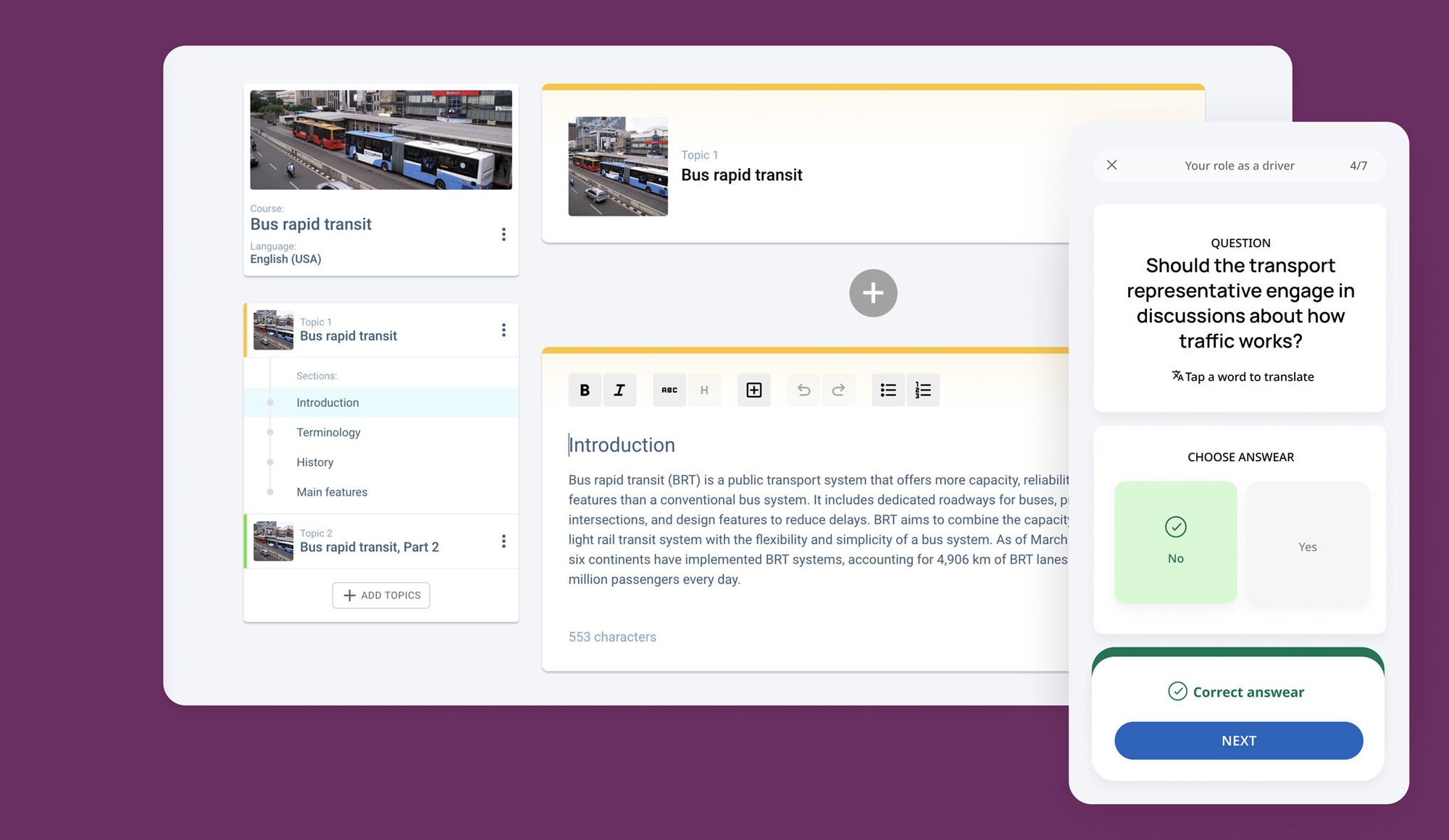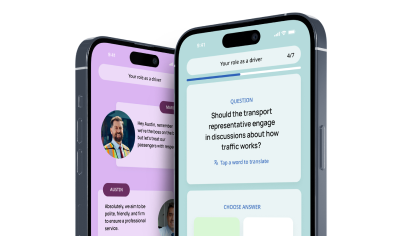Being a successful leader is not limited to those in management. Leadership skills are crucial for professionals at all levels of an organisation. Whether you are a team member, a project lead, or an individual contributor, developing your leadership abilities can significantly impact your team's success and career growth.
Understanding the importance of leadership skills for non-managers
While managers are responsible for a team's overall direction and strategy, non-managers also play a critical role in driving results and inspiring their peers. Leadership training for non-managers aims to equip individuals with the skills and mindset necessary to lead, influence, and collaborate effectively, regardless of their official title or position.
By developing essential leadership skills, non-managers can foster a positive team culture, improve team dynamics, and elevate overall performance. Additionally, honing these skills can boost confidence, enhance decision-making abilities, and open up opportunities for advancement.
Leadership skills for non-managers encompass a wide range of competencies, including effective communication, problem-solving, and emotional intelligence. These skills enable individuals to motivate their colleagues, resolve conflicts, and navigate challenges with resilience and grace. Non-managers who demonstrate strong leadership qualities often earn the respect and trust of their peers, creating a more cohesive and productive work environment.
1. Mastering emotional intelligence: the heartbeat of leadership
Emotional intelligence is a fundamental aspect of effective leadership. It involves recognising and managing your own emotions, as well as understanding and empathising with the feelings of others. By mastering emotional intelligence, non-managers can foster stronger relationships, resolve conflicts more effectively, and inspire their team members.
Through the leadership course, individuals learn techniques to improve their self-awareness, self-regulation, empathy, and social skills. They gain insights into their emotional triggers and develop strategies to manage their emotions in high-pressure situations. By honing emotional intelligence, non-managers create a positive and supportive work environment where everyone can thrive.
Furthermore, emotional intelligence plays a crucial role in decision-making processes within a leadership context. Leaders with high emotional intelligence are better equipped to make sound judgments, as they can consider the facts and figures and the emotional implications of their decisions on individuals and teams. This holistic approach to decision-making leads to more well-rounded and inclusive outcomes, fostering a culture of trust and respect.
Moreover, emotional intelligence is not a fixed trait but a skill that can be developed and enhanced with practice and dedication. By continuously learning and self-reflection, individuals can strengthen their emotional intelligence and adapt their leadership style to different situations and challenges. This ongoing growth mindset is essential for effective leadership in today's dynamic and fast-paced work environments.
2. Speak to inspire: the power of effective communication
Communication lies at the heart of successful leadership. Non-managers must learn to express their ideas clearly, actively listen to others, and adapt their communication style to different situations and individuals. Leadership training provides the tools and techniques to enhance verbal, nonverbal, and written communication skills.
Participants gain confidence in public speaking, learn to engage and motivate their audience and become skilled in delivering constructive feedback. Effective communication fosters understanding, encourages collaboration, and ensures everyone is aligned with common goals.
Moreover, effective communication is not just about our words but also our body language and tone of voice. Nonverbal cues such as facial expressions, gestures, and posture significantly convey our message and build rapport with others. By mastering these nonverbal communication skills, individuals can enhance their overall impact and influence as communicators.
Furthermore, written communication is vital to modern leadership, especially in the digital age. The ability to craft clear and compelling written messages, whether in emails, reports, or presentations, is essential for conveying ideas effectively and maintaining professional relationships. Leadership training equips participants with the necessary writing skills to communicate with clarity, coherence, and persuasiveness in various business contexts.
3. Innovate and elevate: sharpening critical thinking and problem-solving
Leadership development training for non-managers emphasises the importance of critical thinking and problem-solving skills. Non-managers often need help with complex challenges that require innovative solutions. By sharpening their essential thinking abilities, individuals can analyse situations from different perspectives, identify potential risks and opportunities, and make sound decisions.
Through training, participants learn techniques such as brainstorming, root cause analysis, and decision-making frameworks. They also develop the ability to think creatively and encourage innovative thinking within their teams. By honing these skills, non-managers become drivers of change and contribute to the organisation's growth and success.
Moreover, thinking critically and solving problems efficiently is paramount in today's fast-paced business environment. Non-managers who excel in these areas enhance their career prospects and are crucial in driving organisational success. By fostering a continuous learning and improvement culture, companies can stay ahead of the competition and adapt to ever-changing market dynamics.
Furthermore, honing critical thinking is an essential leadership skill that can increase employee engagement and job satisfaction. When individuals feel empowered to contribute ideas and solutions, they are more likely to feel valued and motivated in their roles. This positive work environment fosters creativity and collaboration, benefiting the organisation.
4. Embrace change: building adaptability and resilience
Today, adaptability and resilience are essential qualities for a leader. Non-managers must be able to navigate uncertainty, embrace change, and guide their team through challenging times. Leadership training equips individuals with the tools and mindset to thrive in dynamic and changing circumstances.
Participants learn strategies to embrace change, manage resistance, and stay resilient in adversity. They develop the ability to adapt their plans, communicate effectively during transitions, and inspire others to embrace the unknown. By building adaptability and resilience, non-managers contribute to a positive, agile work culture.
Embracing change is not just about reacting to external factors; it also involves a profound internal transformation. Adaptable and resilient leaders have a growth mindset, viewing challenges as opportunities for learning and development. They understand that change is inevitable and approach it with curiosity and openness rather than fear and resistance.
Furthermore, building adaptability and resilience requires continuous practice and self-reflection. Leaders must regularly assess their responses to change, identify areas for improvement, and seek feedback from colleagues and mentors. By cultivating a culture of adaptability and resilience within an organisation, non-managers can foster innovation, creativity, and long-term success.
5. Unite and conquer: the art of collaboration and team building
Successful teams are built on collaboration, trust, and strong relationships. Non-managers play a vital role in fostering a collaborative work environment. Leadership training provides individuals with the skills and knowledge to build and lead high-performing teams.
Participants learn techniques to enhance team dynamics, resolve conflicts, and leverage the strengths of each team member. They understand the importance of diversity and inclusion and create an environment where everyone feels valued and motivated to contribute their best. Non-managers create a cohesive and united team by mastering the art of collaboration and team building.
Furthermore, effective collaboration and team building improve productivity and boost employee morale and job satisfaction. When team members feel supported and valued, they are more likely to be engaged and committed to the team's goals. This sense of belonging and camaraderie can lead to increased creativity and innovation within the team.
Moreover, collaboration encourages knowledge sharing and cross-functional learning, allowing team members to broaden their skills and expertise. By working together towards a common objective, individuals can learn from each other person's experiences and perspectives, leading to personal and professional growth.
6. Time mastery: prioritisation and productivity for leaders
Influential leaders excel at managing their time and priorities. Non-managers must learn to balance multiple responsibilities, meet deadlines, keep expectations, and ensure their team stays on track. Leadership training equips individuals with strategies, tools, and techniques to enhance productivity and time management.
Participants learn to prioritise tasks, delegate effectively, and avoid everyday time-wasting activities. They also gain insights into personal productivity habits and learn to handle interruptions and distractions. By mastering time management practices, non-managers achieve greater efficiency and create a culture of productivity within their team.
Moreover, managing time effectively is crucial for personal and organisational success in today's fast-paced business environment. Leaders who prioritise tasks efficiently are better equipped to make strategic decisions, drive innovation, and inspire their teams to achieve outstanding results. Time mastery is about completing tasks and creating a work environment that fosters creativity, collaboration, and continuous improvement.
Furthermore, effective time management can improve work-life balance and reduce stress levels. By learning to allocate time wisely, individuals can dedicate more time to their personal lives, hobbies, and interests outside of work. This balance is essential for maintaining overall well-being and preventing burnout, ultimately enhancing job satisfaction and long-term career success.
7. Empower others: coaching and mentoring for success
Leadership is not just about individual success; it also involves empowering and developing others. Non-managers have the opportunity to mentor and coach the manager and their team members, helping them reach their full potential. Leadership training focuses on developing coaching and mentoring skills.
Participants learn techniques for providing effective and positive feedback afterwards, setting goals, and creating development plans. They also develop the ability to inspire and motivate others, identify strengths and development areas, and foster a culture of continuous learning. By empowering others, non-managers create a supportive and growth-oriented team.
Coaching and mentoring are powerful tools that can transform workplace dynamics and enhance productivity. Mentors can provide personalised guidance through one-on-one sessions tailored to the individual's needs and aspirations. This personalised approach helps employees feel valued and supported, increasing job satisfaction and loyalty.
Moreover, coaching and mentoring relationships often extend beyond professional development, fostering a sense of camaraderie and trust within teams. Mentors offer career advice and serve as confidants and sounding boards for their mentees, creating a nurturing environment where individuals can thrive and succeed.
8. Steady under fire: making decisions in high-pressure moments
Leaders are often faced with making critical decisions under pressure. Non-managers must develop the ability to stay calm and make effective decisions even in challenging situations. Leadership training provides individuals with the skills and mindset to thrive under pressure.
Participants learn techniques for managing stress, analysing risks, and making informed decisions quickly. They develop the ability to communicate clearly and confidently during high-pressure moments, inspiring trust and fostering a sense of stability within their team. By mastering decision-making in high-pressure moments, non-managers become reliable anchors during tough times.
One key aspect of handling high-pressure situations is understanding emotional intelligence. Leaders who excel in making decisions under pressure often possess high emotional intelligence, allowing them to regulate their emotions and empathise with others effectively. Emotional intelligence enables individuals to navigate complex interpersonal dynamics during stressful times, fostering a positive team environment.
Moreover, effective decision-making under pressure requires a blend of experience and intuition. While data and analysis play a crucial role in decision-making processes, experienced leaders rely on intuition to guide them in uncertain situations. This intuitive decision-making ability is honed over time through exposure to various scenarios and learning from successes and failures.
9. Harmony in action: mastering conflict resolution
Conflict is inevitable in any team. Non-managers must learn to navigate conflicts effectively, foster favourable resolutions, and maintain a harmonious work environment. Leadership training equips individuals with conflict-resolution skills.
Participants learn techniques to identify the root causes of conflicts, listen actively, and facilitate constructive discussions. They develop strategies to find win-win solutions and build consensus among non-supervisors and team members. By mastering conflict resolution, non-managers promote cooperation, creativity, and team collaboration.
Moreover, mastering conflict resolution benefits the immediate team and has a ripple effect across the entire organisation. When conflicts are resolved efficiently and effectively at lower management levels, it sets a precedent for open communication and problem-solving at all levels. This conflict resolution culture permeates different departments, fostering a more cohesive and productive work environment.
Furthermore, conflict resolution skills are not only valuable in professional settings but also in personal relationships. Navigating disagreements with empathy and diplomacy can enhance interpersonal relationships outside of work. By honing these skills, individuals can build stronger connections, resolve conflicts peacefully, and foster healthier communication in all aspects of their lives.
10. Leading with integrity: the pillars of ethical leadership
Leading with integrity is a cornerstone of effective leadership. Non-managers must exemplify ethical behaviour, making decisions that are fair, transparent, and aligned with the organisation's values. Leadership training emphasises the importance of moral leadership.
Participants gain valuable insights into ethical dilemmas, develop moral reasoning skills, and learn to make ethical decisions even in complex situations. They understand the significance of trust and authenticity in leadership and set a positive example for their peers. By leading with integrity, non-managers inspire trust, foster a positive work culture, and contribute to the organisation's reputation and success.
Furthermore, ethical leadership goes beyond just following rules and regulations; it involves a deep understanding of the impact of one's decisions on various stakeholders. Leaders who operate with integrity consider not only the short-term gains but also the long-term consequences of their actions on employees, customers, the organisation, and the wider community.
Practical, ethical leadership also promotes a culture of open communication and accountability within the organisation. Leaders who lead with integrity encourage and support their team members to speak up about moral concerns, fostering a transparent and supportive work environment where ethical issues can be addressed promptly and effectively.
The long-term benefits of leadership training for non-managers
Investing in leadership training for non-managers yields long-term benefits for both individuals and organisations. Non-managers who develop leadership qualities become more effective leaders and influencers, driving positive change and enhancing team performance.
Organisations benefit from the increased engagement and productivity of their non-managerial employees. They also create a talent pool of potential future leaders who can take on greater responsibilities. Leadership training for non-managers invests in the growth and success of individuals and the organisation.
Furthermore, leadership training can help non-managers develop crucial soft skills such as communication, conflict resolution, and decision-making. These skills are essential for fostering a positive work environment and building strong team relationships. By honing these skills, non-managers can effectively collaborate with colleagues, handle challenging situations, and contribute to a harmonious workplace culture.
In addition to enhancing individual capabilities, leadership training for non-managers can also improve employee retention rates. When non-managers feel supported and empowered to grow in their roles, they are likelier to stay with the organisation long-term. This continuity benefits the company by retaining valuable talent and contributes to stability and consistency within the workforce.
Take your leadership skills to the next level with Lingio
Ready to transform your leadership potential into action? At Lingio, we're dedicated to making learning an engaging and enjoyable journey. Whether you want to elevate your team's performance or enhance your leadership skills. Take advantage of the opportunity to see how our tailored solutions can benefit you and your organisation. Book a demo today and start leading with confidence and creativity!
FAQs
1. Who can benefit from leadership training for non-managers?
Leadership training for non-managers is beneficial for professionals at all levels who want to enhance their leadership skills, regardless of their official titles or positions. Whether you are a team member, a project lead, or an individual contributor, developing your leadership abilities can significantly impact your career growth and your team's success.
2. How can leadership training for non-managers be implemented in organisations?
Organisations can implement leadership training for non-managers through online courses or customised training programs. It is essential to provide opportunities for individuals to apply the skills they learn in the program in their day-to-day work. Additionally, organisations can develop mentoring programs and create a culture that recognises and values leadership potential among non-managers.
3. What is the difference between leadership training for managers and non-managers?
While managers and non-managers can benefit from leadership training, the focus may differ. Leadership training for managers often revolves around strategic thinking, team management, and higher-level decision-making. On the other hand, leadership training for non-managers emphasises influencing skills, effective communication, and collaboration within a team or across departments.
4. How long does it take to see the impact of leadership training for non-managers?
The impact of leadership training for non-managers can vary depending on the individual and the organisation. However, with consistent application of learned skills and continuous leadership development courses, individuals can start seeing positive changes in their leadership abilities within a few months. The long-term impact can be transformational, contributing to personal growth and career advancement.
5. What resources are available for non-managers to continue their leadership development?
Non-managers can continue their leadership development by seeking mentorship or coaching opportunities, joining professional networks or associations, attending conferences and workshops, and reading leadership books or articles. Many organisations also offer ongoing training and development programs for non-managers to teach and enhance their leadership skills.
Moreover, leadership training for non-managers can also enhance cross-functional collaboration within an organisation. By equipping individuals with leadership expertise and the necessary skills to effectively communicate and collaborate with colleagues from different departments, it breaks down silos and promotes a culture of teamwork. Combining diverse perspectives and expertise can improve efficiency, innovation, and problem-solving.


Table of contents
Intro
Understanding the importance of leadership skills for non-managers
1. Mastering emotional intelligence: the heartbeat of leadership
2. Speak to inspire: the power of effective communication
3. Innovate and elevate: sharpening critical thinking and problem-solving
4. Embrace change: building adaptability and resilience
5. Unite and conquer: the art of collaboration and team building
6. Time mastery: prioritisation and productivity for leaders
7. Empower others: coaching and mentoring for success
8. Steady under fire: making decisions in high-pressure moments
9. Harmony in action: mastering conflict resolution
10. Leading with integrity: the pillars of ethical leadership
The long-term benefits of leadership training for non-managers
Take your leadership skills to the next level with Lingio
FAQs

